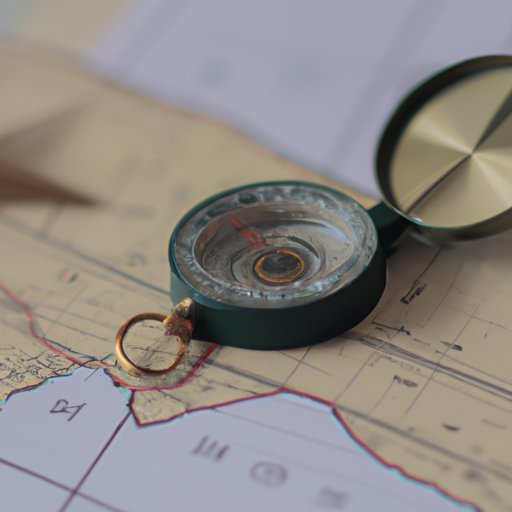Introduction
The invention of the compass was a revolutionary moment in human history that changed the way we navigate and explore the world. The invention of the compass allowed for more accurate navigation, which allowed people to explore further than ever before. This article will explore the background of the invention of the compass, the role of the Chinese in its development, the impact of the invention of the compass on trade and exploration, and how it changed the world.

History of the Invention of the Compass: How It Changed Navigation
The earliest known compasses date back to the 5th century BC in China. However, it wasn’t until the 11th century AD that the first magnetic compass was invented by the Chinese. The invention of the magnetic compass marked a major turning point in navigation as it allowed sailors to determine their direction without relying on landmarks or the stars.
The evolution of magnetic navigation continued throughout the centuries, with various improvements being made to the design and accuracy of the compass. By the 15th century, compasses had become a standard navigational tool for seafaring vessels. Compasses were also used for land-based navigation, though they were not as accurate as they were for sea navigation.
The impact of the invention of the compass was immense. Not only did it allow for more accurate navigation, but it opened up new opportunities for exploration and trade. With the invention of the compass, sailing became much safer and more efficient, allowing ships to travel further and faster than before.
Exploring the Role of the Chinese in Inventing the Compass
The Chinese played an important role in the invention of the compass. While the earliest compasses were simple lodestones, the Chinese were the first to develop the traditional Chinese compass. This compass consisted of a needle mounted on a plate of metal, with a hole in the center of the plate where the needle could be adjusted.
Chinese scholars also made significant contributions to the understanding of magnetism and the use of compasses. The Chinese philosopher Shen Kuo wrote extensively about the properties of magnets and their use in navigation in his book Dream Pool Essays. His work laid the foundation for the development of the modern compass.

The Impact of the Invention of the Compass on Trade and Exploration
The invention of the compass had a profound impact on trade and exploration. The increased accuracy of navigation allowed for the expansion of trade routes, which allowed merchants to reach more distant markets. This in turn led to a booming international trade network.
The invention of the compass also enabled European explorers to venture further out into the world. With the aid of the compass, they were able to chart new courses and explore unknown lands. This opened up new worlds and ushered in an age of exploration and discovery.
A Look at How the Invention of the Compass Revolutionized Travel
The invention of the compass revolutionized travel in many ways. One of the most obvious benefits was the increased ease of finding directions. Before the invention of the compass, travelers had to rely on landmarks and the stars to find their way. With the compass, they could easily determine their direction and stay on course.
The invention of the compass also advanced maritime exploration. With the compass, sailors could accurately chart their course and sail farther than ever before. This allowed them to explore new lands and discover new cultures.
Finally, the invention of the compass opened up new worlds. With the increased accuracy of navigation, explorers were able to travel further and explore uncharted territories. This allowed them to expand their knowledge of the world and uncover new discoveries.
Examining the Technological Advances That Allowed for the Invention of the Compass
The invention of the compass was only possible due to several technological advances. First and foremost, an understanding of magnetism was necessary in order to create a working compass. Without this knowledge, the compass would not be able to function properly.
In addition, improved manufacturing techniques were necessary in order to create a more accurate and reliable compass. Finally, the refinement of scientific instruments such as telescopes and sextants allowed for more precise measurements and greater accuracy in navigation.

Understanding the Significance of the Invention of the Compass
The invention of the compass had a lasting impact on navigation, trade, and exploration. It allowed for more accurate navigation, which opened up new opportunities for exploration and trade. It also revolutionized travel, making it easier and safer to find one’s way.
The legacy of the invention of the compass is still felt today. Modern compasses are still used for navigation, though they have been supplemented by GPS and other technologies. But even with these advancements, the compass remains an indispensable tool for travelers.

Analyzing How the Invention of the Compass Changed the World
The invention of the compass changed the world in many ways. For starters, it improved mapping and navigation, allowing for more accurate charts and maps. This was especially beneficial for exploration, as it allowed explorers to chart new courses and discover new lands.
The invention of the compass also enabled the expansion of global trade. With more accurate navigation, merchants were able to safely reach distant markets and open up new trading networks. This in turn drove economic growth and prosperity.
Finally, the invention of the compass increased access to knowledge. With more accurate navigation, explorers were able to travel further and uncover new information about the world. This allowed them to gain a better understanding of the world around them.
Conclusion
The invention of the compass was a revolutionary moment in human history. It changed the way we navigate and explore the world and opened up new opportunities for trade and exploration. The invention of the compass revolutionized travel, making it easier and safer to find one’s way. And it allowed for the expansion of global trade and the spread of knowledge. Today, the legacy of the invention of the compass is still felt in our navigation tools, our maps, and our understanding of the world.
(Note: Is this article not meeting your expectations? Do you have knowledge or insights to share? Unlock new opportunities and expand your reach by joining our authors team. Click Registration to join us and share your expertise with our readers.)
